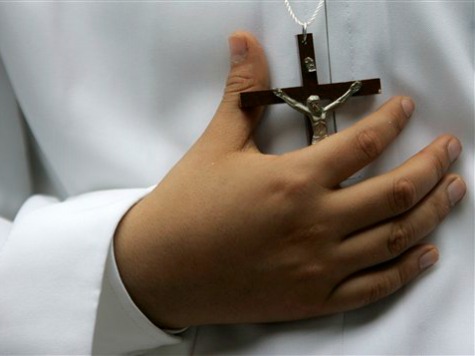A new document released this week in Rome puts a wet blanket on the hopes of many Church progressives. The working document in preparation for the global Synod of Bishops reasserts core Church teachings on controversial issues the left had hoped would change.
The paper is not a teaching document, but rather a report of sorts drawn from suggestions of national bishops conferences around the world, and is intended to inform the dialogue at the upcoming Extraordinary Synod of Bishops that convenes this October in Rome.
This Pope has raised progressive hopes repeatedly since his elevation to the Papacy.
Last year, the Church announced a global poll of sorts, asking Bishops to get input from the laity on the controversial issues in the Church and society. Some looked upon the poll as an indication that change could come to some of the teachings those in North America and Europe find most difficult: divorce and remarriage, reception of communion for the divorced, contraception, even same-sex relationships.
Progressive enthusiasm only increased over the months as Pope Francis made certain statements that seemed to indicate he was open to changes in Church teaching.
He famously said, “Who am I to judge” a priest who had same sex attraction but was trying to live according to the teachings of the Church.
He reportedly called a divorced woman in Argentina and told her she was welcome to receive communion, though this was never confirmed.
He said the Church should talk about more than the hot button issues of abortion and contraception, though he consistently reiterated Church teachings on these issues.
Even so, thanks largely to the media and wishful thinking, many of his comments had the effect of making progressive hearts beat a little faster. The release of the new document should put a damper on these hopes.
The most striking thing about the document is that it is almost completely about the hot button issues the Pope supposedly does not want the Church to talk about.
The document makes clear the Church cannot accept any type of same-sex union–and certainly nothing that can be called “marriage.” The document also reiterates that people who are divorced and remarried may not receive communion, though those who are divorced and not remarried may. The document insists that contraception is not allowed, and neither are things like in vitro fertilization and assisted reproductive technologies. The Church condemns the epidemic of co-habitation.
Specifically on same-sex relationships, the document says, “There are absolutely no grounds for considering homosexual unions to be in any way similar or even remotely analogous to God’s plan for marriage and family.”
Regarding adoption of children by same-sex couples, the document reiterates long-standing Church teaching: “The responses are clearly opposed to legislation which would allow the adoption of children by persons in a same-sex union, because they see a risk to the integral good of the child, who has the right to have a mother and father, as pointed out recently by Pope Francis.”
The document suggests the Church wants to find a way to help discrete same-sex couples, those who live quietly so as “not to give scandal” but draws a line at others “whose behavior promotes and actively–often aggressively–calls attention to it.” The document suggests that those with same-sex attraction not self-identify or announce as “gay,” “lesbian,” or “homosexual.”
The document does reiterate Church teaching that those with same-sex attraction should be treated with respect and not subjected to “unjust discrimination.” The document says that children from same-sex couples offered for baptism ought to be welcomed, but that the couple must raise the child in the faith and that the selection of godparents becomes crucial to ensure the child will be taught the faith properly.
One of the recurrent themes in the document is “gender ideology,” which is addressed several times.
In a paragraph on the natural law and human rights, the document laments that “legal systems in many countries are having to make laws on situations which are contrary to the traditional dictates of the natural law (for example, in vitro fertilization, homosexual unions, the manipulation of human embryos, abortion, etc.).” It goes on to state, “Situated in this context is the increased diffusion of the ideology called gender theory, according to which the gender of each individual turns out to be simply the product of social conditioning and needs and, thereby, ceasing, in this way, to have any correspondence to a person’s biological sexuality.”
Another paragraph says gender ideology “tends to exert its influence even at the elementary level, spreading a mentality which, intending to elimination homophobia, in fact, to undermine sexual identity.”
As was clear when the “poll” was announced last year, the document is not concerned with changing any teaching of the Church, but rather with how Church teachings are communicated and received by the lay faithful. The document makes clear there is a crisis in both.
Progressive hopes still run high.
Lester Feder believes the Church is on the cusp of allowing divorced and remarried people to receive communion and that the baptism of children from same-sex relationships will become ordinary. The document makes clear that this would be possible only if the couple agreed to raise the child in the Church, which presumably would include the child’s understanding that homosexuality is, according to the Catechism of the Catholic Church, disordered.

COMMENTS
Please let us know if you're having issues with commenting.